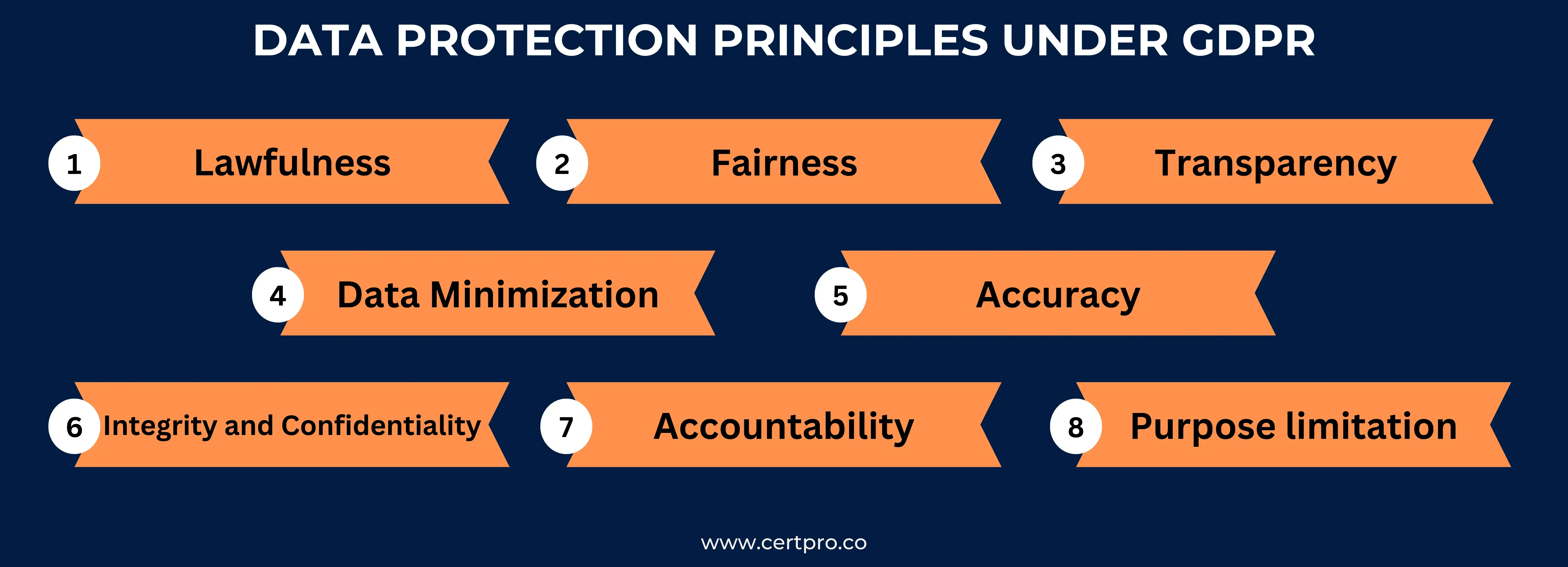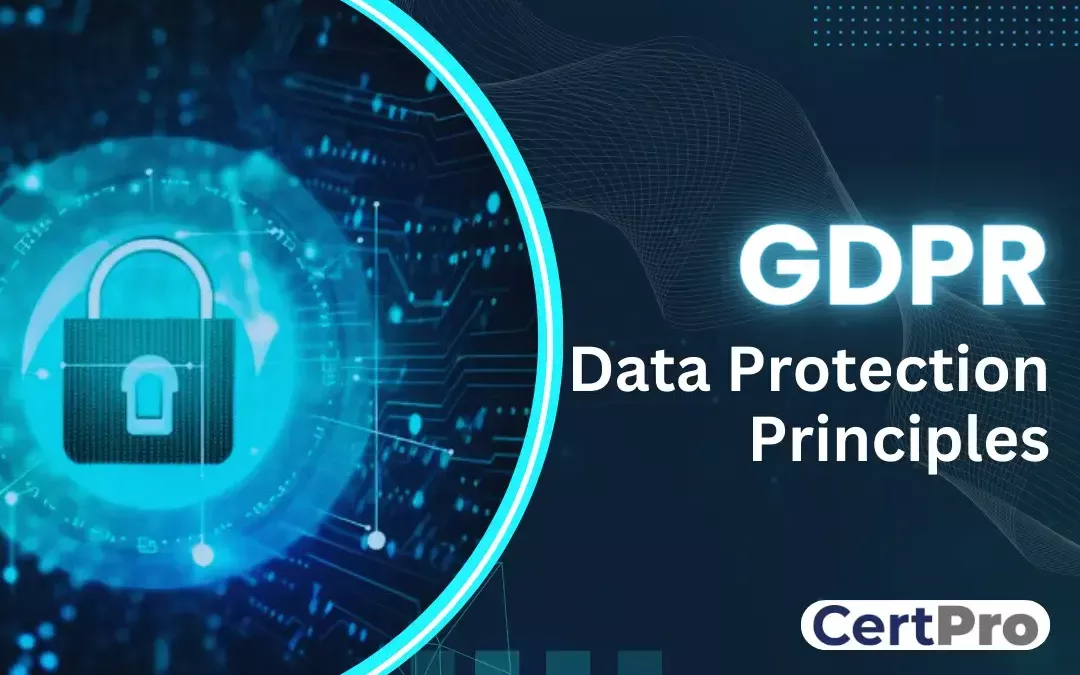In our increasingly digital world, the rapid growth of technology has resulted in a significant rise in the collection, processing, and sharing of personal data. Consequently, safeguarding personal data has become paramount. To address this, the European Union introduced the General Data Protection Regulation (GDPR), a comprehensive framework designed to protect individuals’ privacy rights and establish a standardized approach to data protection.
The GDPR’s data protection principles serve as the foundation for organizations to ensure the respect of individuals’ rights and privacy during the collection and processing of their personal data. Conducting a thorough analysis allows organizations to assess their level of compliance, identify any gaps or areas of non-compliance, and develop strategies to rectify these issues.
This article serves as a comprehensive guide, empowering businesses to understand and implement these principles. By doing so, organizations can achieve GDPR compliance, foster trust with their customers, and ensure the secure and ethical handling of personal data.
WHAT IS GDPR AND ITS PURPOSE?
Companies should be GDPR-compliant to protect individuals’ data, and organizations that collect the data should do so in a responsible manner. GDPR compliance also mandates that personal data be maintained safely. The regulation says personal data must be protected against “unauthorized or unlawful processing, and against accidental loss, destruction, or damage.”
The justifications for acquiring personal data are also outlined in GDPR compliance: the data must be gathered for a clear, justifiable reason and shouldn’t be used in any other way. According to the rule, data collection should be “limited to what is necessary in relation to the purposes for which it is processed.”
In order to comply with GDPR, the entity collecting the data must make sure it is correct and updated as needed. According to GDPR principles, businesses must fulfill at least one of the following six requirements in order to lawfully process any person’s personally identifiable information (PII):
- Express consent of the data subject.
- Processing is necessary for the performance of a contract with the data subject or to take steps to enter into a contract.
- Processing is required to comply with a legal requirement.
- Processing is required to safeguard a data subject’s or another person’s vital interests.
- Processing is required to carry out a job in the public interest or in the execution of the controller’s official authority.
- Processing is necessary to further the controller’s or a third party’s legitimate interests, unless those interests conflict with the rights or interests of the data subject.
WHAT ARE DATA PROTECTION PRINCIPLES UNDER GDPR?
Data protection principles are a set of fundamental guidelines that govern the processing of personal data and ensure the protection of individuals’ privacy rights.
These principles provide a framework for organizations to handle personal data responsibly and lawfully. While specific data protection principles may vary slightly between different privacy regulations, the underlying principles generally include:
1. Lawfulness, Fairness, and Transparency: Personal data must be processed lawfully, meaning there must be a valid legal basis for processing, such as consent or legitimate interest. The processing must also be fair and transparent, with individuals being informed about how their data will be used.
2. Data Minimization: Organizations should only collect and retain personal data that is necessary for the purposes for which it is being processed. Data should be limited to what is relevant, adequate, and not excessive.
3. Accuracy: Personal data must be accurate, and reasonable steps should be taken to ensure its accuracy. Inaccurate or outdated data should be rectified or erased promptly.
4. Integrity and Confidentiality: Organizations are responsible for protecting the security and confidentiality of personal data.
5. Accountability: Organizations are responsible and answerable for their data processing activities. They should have internal policies, procedures, and documentation in place to demonstrate compliance with data protection laws.
6. Purpose limitation: According to the concept of purpose limitation, personal information should only be gathered for clear, explicit, and legal purposes and should not be used for purposes unrelated to those for which it was originally obtained.

BENEFITS OF DATA PROTECTION PRINCIPLES
In order to preserve people’s privacy and promote trust in the digital age, data protection principles, like those described in the General Data Protection Regulation (GDPR), are essential. The following are some of the main advantages of following data protection principles:
The key benefits of adhering to data protection principles include:
1. Privacy Protection: Data protection principles prioritize the privacy and confidentiality of personal data. By implementing these principles, individuals can have greater control over their personal information and ensure that it is handled in a secure and responsible manner.
2. Risk Mitigation: Organizations may lower their risk of data breaches, legal challenges, and reputational damage, all of which can have serious financial and operational repercussions, by putting data protection principles into effect and adhering to best practices.
3. Legal Compliance: Adhering to data protection principles ensures compliance with privacy laws and regulations. By following these principles, organizations can avoid legal penalties, fines, and reputational damage that may result from non-compliance. Compliance also demonstrates good corporate governance and ethical practices.
4. Data Accuracy and Quality: Data protection principles emphasize the accuracy and quality of personal data. By implementing measures to ensure data accuracy, organizations can make informed decisions based on reliable information.
5. Enhanced Data Security: Data protection principles promote the implementation of appropriate security measures to safeguard personal data. By securing data against unauthorized access, organizations can mitigate the risk of data breaches, identity theft, and other security incidents.
6. Transparent Data Practices: Data protection principles advocate for transparency in data processing. Organizations that adopt transparent Practices provide individuals with clear and understandable information about how their data is collected, used, and shared.
7. Innovation and Data-driven Insights: Data protection principles do not hinder innovation; instead, they foster responsible data innovation. By ensuring that personal data is processed lawfully and ethically, organizations can develop innovative solutions, products, and services that respect privacy rights.
8. Global Business Compliance: The GDPR served as a model for several nations’ adoption of data protection rules. Organizations can operate globally and extend their influence without facing severe legal obstacles by adhering to these guidelines.
GET EXPERT ASSISTANCE FOR GDPR COMPLIANCE
CertPro is one of the leading providers of GDPR compliance solutions, offering a range of services to help organizations achieve and maintain compliance with the GDPR. Providing comprehensive assessments and audits to identify gaps and areas of non-compliance within an organization’s data processing practices helps companies stay out of trouble. Certpro’s expertise lies in guiding businesses through the complex process of GDPR compliance.
FAQ
HOW DOES THE GDPR DEFINE PERSONAL DATA?
The GDPR defines personal data as any information relating to an identified or identifiable individual. It encompasses direct identifiers like names and addresses as well as indirect identifiers.
HOW DOES GDPR AFFECT INDIVIDUALS ?
GDPR provides individuals with enhanced rights regarding their personal data. Individuals have the right to access or erase their data under certain circumstances.
DOES GDPR APPLY ONLY TO EU ORGANIZATIONS ?
No, GDPR has extraterritorial applicability. It applies to organizations located outside the EU if they offer goods or services to EU residents or monitor their behavior.
What IS THE SCOPE UNDER THE GDPR?
The GDPR, which applies to the processing of personal data, only protects data that relates to an identified or identifiable individual. The law does not protect trade secrets or other private business information that relates to a legitimate corporation.
WHO DOES THE GDPR APPLY TO?
Any company or organization that has a “stable arrangement” or place of business within the European Economic Area (EEA), which is made up of all EU member states as well as Iceland, Liechtenstein, and Norway

About the Author
SHREYAS SHASTHA DRUPADHA
Shreyas Shastha Drupadha, a Senior Business Consultant. Serving as an ISO 27001 Lead Auditor, Shreyas ensures the establishment of robust information security management systems. His expertise also encompasses GDPR, HIPAA, CCPA, and PIPEDA implementation.
HOW TO CONDUCT A GDPR AUDIT FOR MY BUSINESS?
The General Data Protection Regulation (GDPR) is vital for today's digital landscape. It is a cornerstone for safeguarding people's privacy rights in the European Union (EU). Therefore, organizations dealing with EU residents' data must follow these GDPR rules....
GDPR DATA BREACH NOTIFICATION: THE ULTIMATE GUIDELINE FOR SECURING DATA
Modern businesses require incorporating personal data protection strategies to ensure customer satisfaction and business growth. In this respect, the European Union's General Data Protection Regulation (GDPR) sets strict standards for maintaining data security....
GDPR Compliance Software: Boosting Business Efficiency
Handling large amounts of personal data has become a significant concern in today's digital landscape, necessitating a thorough understanding of the intricate legal framework, particularly within the European Union. An essential piece of legislation in this regard is...




